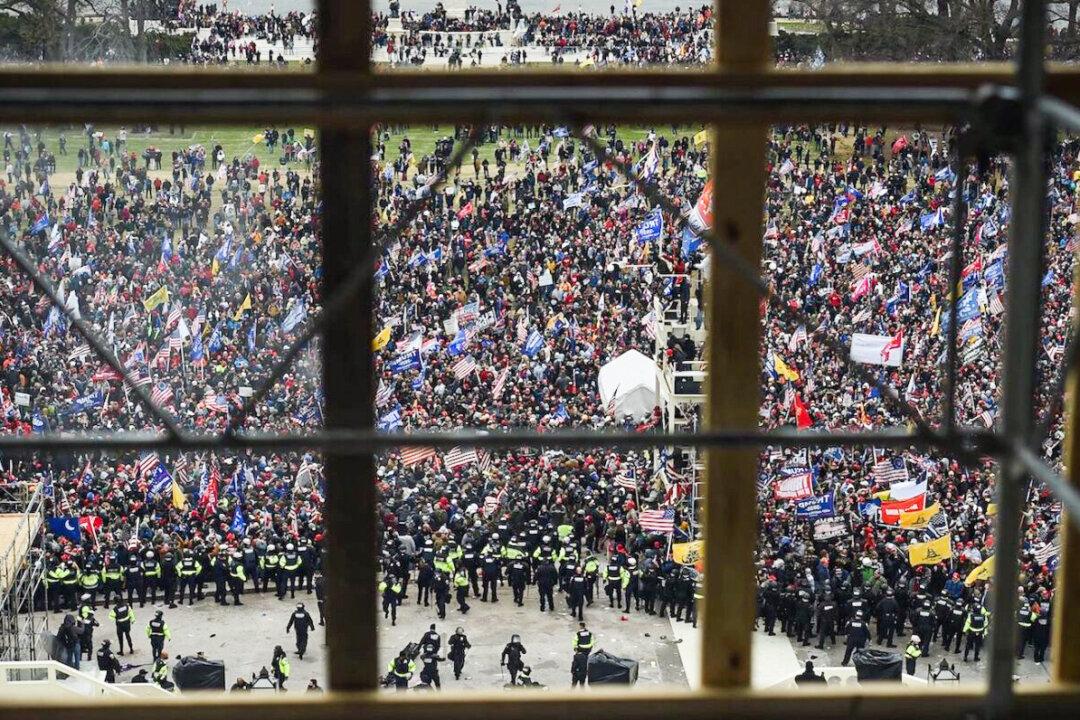A Jan. 6, 2021, Capitol Hill protester has appealed a federal judge’s decision to dismiss a lawsuit against the FBI for allegedly violating his constitutional rights during a June 2021 raid of his home.
Siaka Massaquoi, an African-American actor who participated in the Jan. 6 event, initially sued the FBI last July, a month after about 20 armed agents raided his North Hollywood home. A federal judge tossed the lawsuit on April 11, but Massaquoi’s appeal was entered in the U.S. Court of Appeals for the Ninth Circuit last week.
According to the lawsuit, the FBI broke into his home “to chill, silence, and retaliate against the exercise of free speech and assembly by Massaquoi and other U.S. citizens that disagree with the viewpoints and agendas of elected officials and prevailing thought in the political world, and to intimidate citizens from expressing their political opinions and beliefs.”
“Massaquoi has been targeted as a conservative African-American to try to bury the fact that Americans of all races and religions support the return of America’s governance to the people under the populist movement of Make America Great Again promoted by Donald Trump,” the lawsuit said.
Massaquoi said special agents told him they were executing a search warrant on his home because he was in a Telegram group with Russ Taylor, who was charged with conspiracy to disrupt an official proceeding in June 2021 for his participation in the Jan. 6 event.
“Thus, [the FBI] illegally and unconstitutionally invaded Plaintiff’s home only because he belonged to a group on a communication platform,” he argued.
Massaquoi was not charged with any crimes, but agents took multiple computer devices during the search of his home, he said.
Even though the FBI has the ability to extract data from the devices and return them, Massaquoi said his property still has not been returned. The same goes for two of his Make America Great Again (MAGA) hats, he said.
“The fact that the [FBI] seized two red MAGA caps from plaintiff Massaquoi’s house further demonstrates that the actions are political and malicious,” the lawsuit said. “Massaquoi owning a MAGA hat is not useful evidence because of the sheer number of MAGA hats in the country. But Defendants’ seizing Massaquoi’s MAGA hats is a perfect illustration of the true motive, ill-intent, and message of these politicized unconstitutional actions.”
The FBI moved to dismiss the lawsuit on the grounds that the search warrant against Massaquoi was lawful.
“Plaintiff speculates that ‘the warrant was obtained by Defendants through intentional lies if not outright fraud’ … [However], by Plaintiff’s own admissions of his actions on January 6, 2021, the warrant was not ‘entirely unreasonable,’” the FBI’s February 15 motion to dismiss said. “Plaintiff, therefore, will be unable to plead that the warrant was ‘based on an affidavit so lacking in indicia of probable cause as to render official belief in its existence entirely unreasonable.’”
A federal judge granted the FBI’s motion on March 15. Massaquoi motioned for the judge to reconsider, but the judge denied his request on April 11.
“Plaintiff does not allege that [the FBI ] was acting without a warrant,” wrote District Judge Stephen Wilson in his decision. “Instead, at its most specific, plaintiff’s complaint includes allegations like, ‘defendants broke into Massaquoi’s house to … intimidate him.’
“Such allegations do not give rise to a plausible basis for relief.”
Massaquoi filed a motion to appeal to the Ninth Circuit on April 29, and the case was docketed on May 4. He has until July 7 to file his opening brief, and the FBI will have until August 8 to respond.
Taylor faces a status conference on May 26.




